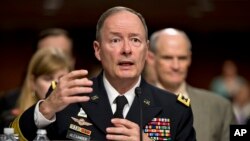WASHINGTON —
The head of the National Security Agency told a U.S. congressional panel on Wednesday that dozens of terrorist attacks have been prevented thanks to a recently revealed surveillance program that has raised concerns about privacy.
Gen. Keith Alexander, director of the National Security Agency, appeared before a Senate panel looking into cybersecurity threats.
But a number of senators appeared more concerned about a secret surveillance program that has been mining Americans’ telephone and Internet data.
Senator Patrick Leahy of Vermont asked the NSA chief how many attacks had been thwarted by data collected under Section 215 of the Patriot Act, which was signed into law shortly after the terrorist attacks on the United States on September 11, 2001.
Alexander: It’s dozens of terrorist events that these have helped prevent.
Leahy: Ok, so dozens. Now we collect millions of millions of millions of records through 215, but dozens of them have proved crucial, or critical, is that right? Dozens?
Alexander: For both here and abroad, in disrupting or contributing to the disruption of terrorist attacks.”
Leahy: Out of those millions, dozens have been critical.”
Alexander: That’s correct.
The questioning came after details of the program were leaked by a government contractor.
Senator Richard Durbin of Illinois pointed out that the contractor, Edward Snowden, was a 29-year-old high school dropout who had worked as a security guard at the NSA. Durbin said he wanted to look at that resume.
“And ask you if you’re troubled that he was given that kind of opportunity to be so close to important information that was critical to the security of our nation,” Durbin said.
“I do have concerns about that, over the process, Senator. I have great concerns over that, the access that he had, Alexander said.
Alexander, who also heads the U.S. Cyber Command, promised to declassify some information in the coming days to show that the surveillance programs are working lawfully and in the national interest.
“This is not us doing something under the covers, this is what we’re doing on behalf of all of us, for the good of this country. Now, what we need to do, I think, is to bring as many facts as we can out to the American people," Alexander said.
Several lawmakers said that U.S. intelligence agencies are engaged in a cyber war and need, as one of them put it, “a little space.”
Gen. Keith Alexander, director of the National Security Agency, appeared before a Senate panel looking into cybersecurity threats.
But a number of senators appeared more concerned about a secret surveillance program that has been mining Americans’ telephone and Internet data.
Senator Patrick Leahy of Vermont asked the NSA chief how many attacks had been thwarted by data collected under Section 215 of the Patriot Act, which was signed into law shortly after the terrorist attacks on the United States on September 11, 2001.
Alexander: It’s dozens of terrorist events that these have helped prevent.
Leahy: Ok, so dozens. Now we collect millions of millions of millions of records through 215, but dozens of them have proved crucial, or critical, is that right? Dozens?
Alexander: For both here and abroad, in disrupting or contributing to the disruption of terrorist attacks.”
Leahy: Out of those millions, dozens have been critical.”
Alexander: That’s correct.
The questioning came after details of the program were leaked by a government contractor.
Senator Richard Durbin of Illinois pointed out that the contractor, Edward Snowden, was a 29-year-old high school dropout who had worked as a security guard at the NSA. Durbin said he wanted to look at that resume.
“And ask you if you’re troubled that he was given that kind of opportunity to be so close to important information that was critical to the security of our nation,” Durbin said.
“I do have concerns about that, over the process, Senator. I have great concerns over that, the access that he had, Alexander said.
Alexander, who also heads the U.S. Cyber Command, promised to declassify some information in the coming days to show that the surveillance programs are working lawfully and in the national interest.
“This is not us doing something under the covers, this is what we’re doing on behalf of all of us, for the good of this country. Now, what we need to do, I think, is to bring as many facts as we can out to the American people," Alexander said.
Several lawmakers said that U.S. intelligence agencies are engaged in a cyber war and need, as one of them put it, “a little space.”




